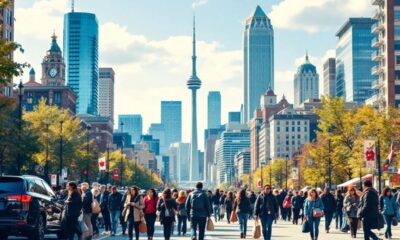Foreign Policy
Trudeau Reverses Course on Immigration as Support Plunges

Prime Minister Justin Trudeau has announced a significant shift in Canada’s immigration policy, reducing the number of permanent residents the country will accept next year. This decision comes in response to declining public support for immigration, which has been affected by record inflows of newcomers.
Key Takeaways
- Canada will admit 395,000 permanent residents in 2025, a nearly 20% decrease from the expected 485,000 this year.
- Immigration Minister Marc Miller indicated that the numbers will continue to decline by approximately 4% annually through 2027.
- This policy reversal marks a notable change in Trudeau’s approach to immigration, which has been a cornerstone of his administration.
Background on Immigration in Canada
Canada has long been known for its welcoming stance towards immigrants, with policies designed to attract skilled workers and support family reunification. However, recent challenges, including housing shortages and rising living costs, have led to increased public scrutiny of immigration levels.
Public Sentiment and Political Pressure
Recent polls indicate a significant drop in public support for high immigration levels. Many Canadians express concerns about the impact of immigration on local resources, housing, and job availability. This shift in sentiment has put pressure on Trudeau’s government to reconsider its immigration strategy.
New Immigration Targets
The new immigration targets set by the government are as follows:
| Year | Permanent Residents Target | Change from Previous Year |
|---|---|---|
| 2024 | 395,000 | -20% |
| 2025 | 380,000 | -4% |
| 2026 | 365,000 | -4% |
| 2027 | 350,000 | -4% |
This table illustrates the planned reduction in immigration numbers over the next few years, reflecting the government’s response to public concerns.
Implications of the Policy Change
The decision to reduce immigration levels could have several implications:
- Economic Impact: A decrease in immigration may affect labor markets, particularly in sectors that rely heavily on immigrant workers.
- Social Dynamics: Changes in immigration policy could alter the demographic landscape of Canada, impacting cultural diversity and community dynamics.
- Political Ramifications: This shift may influence voter sentiment and could have repercussions for Trudeau’s Liberal Party in upcoming elections.
Conclusion
Trudeau’s reversal on immigration policy marks a significant pivot in response to public opinion. As Canada navigates the complexities of immigration, the government will need to balance economic needs with the concerns of its citizens. The coming years will be crucial in determining the long-term effects of this policy change on Canadian society and its economy.
Sources
-

 Business5 days ago
Business5 days agoTech Stocks Rally as Trump Offers Tariff Exemptions
-

 Business4 days ago
Business4 days agoUS Stock Market Plummets as Trump Escalates Tariff Threats
-

 Business5 days ago
Business5 days agoUS Stock Market Faces Turbulence Amid Tariff Turmoil
-

 Celebrity News4 days ago
Celebrity News4 days agoTaylor Swift and Travis Kelce Share Sweet Moments at the U.S. Open
-

 Business5 days ago
Business5 days agoUS Government Bonds Face Unprecedented Sell-Off Amid Economic Turmoil
-

 Press Release7 days ago
Press Release7 days agoCoinscope.gg Launches as an Innovative Platform for Comprehensive Cryptocurrency Event Tracking
-

 Press Release4 days ago
Press Release4 days agoThe Age of AI and the Evolution of Blockchain Ecosystems: The Emergence of Polycat.io
-

 Stock Market3 days ago
Stock Market3 days agoUS Stock Market Volatility: Tariff Turmoil and Trade War Uncertainty





































